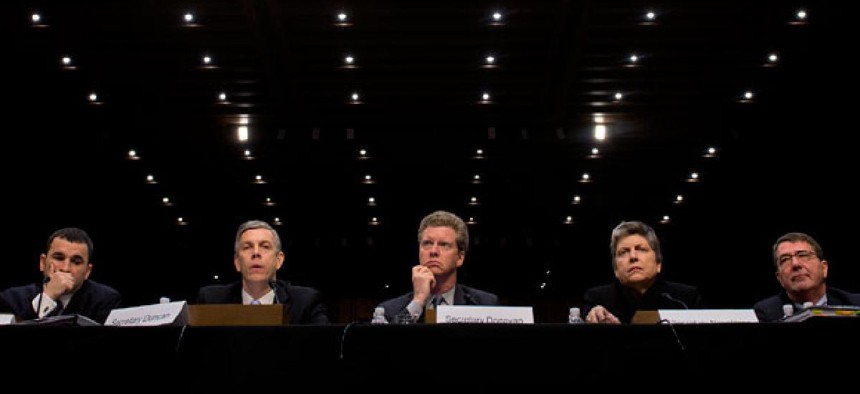
U.S. Controller Danny Werfel; Education Secretary Arne Duncan; HUD Secretary Shaun Donovan; DHS Secretary Janet Napolitano; and Deputy Defense Secretary Ashton Carter prepare to testify before a Senate committee on Thursday. Tom Williams/CQ Roll Call
Most Sequestration Furloughs Won't Begin Before April
Department heads agree the automatic cuts would be ‘dumb.’
Federal employees will not feel the immediate impact of sequestration, should automatic budget cuts set to go into effect March 1 take place, an Obama administration official said Thursday.
Office of Management and Budget Controller Danny Werfel told the Senate Appropriations Committee that union negotiations would start on March 1, if sequestration hasn’t been averted, and most federal employees would not receive furlough notices until mid-March.
“Will the furloughs take place on March 1st?” Werfel asked himself rhetorically. “No, because of legal requirements,” referring to the need to bargain with unions and provide 30 days notice to employees.
OMB clarified on Friday that Werfel was referring specifically to Defense Department civilians when setting April as the earliest possible start date for sequestration furloughs. The Obama administration is leaving open the possibility furlough notices could be sent out to non-Defense feds before March 1.
Asked if food inspectors could be exempted from sequestration, Werfel said it would be impossible because 88 percent of the Food Safety Inspections Service's budget goes toward salaries. He added that because food manufacturing plants cannot legally operate without inspection, many would be forced to temporarily shut down if the threat of sequestration becomes reality.
He also said the Federal Aviation Administration would need to issue furloughs for nearly all of its 47,000 employees, including air traffic controllers.
Sen. Susan Collins, R-Maine, said lawmakers should consider the kind of people who will be affected by the cuts. “Too often, [the civilian workforce] is thought of as white-collar employees inside the beltway,” Collins said. “These are welders, nuclear engineers, pipe fitters who are going to work at a pier. These are firefighters who put out a fire on a nuclear submarine, and I think we need to keep that in mind.”
Homeland Security Secretary Janet Napolitano said the cuts would force Customs and Border Protection to reduce its work hours by the equivalent of more than 5,000 Border Patrol agents and 2,750 CBP officers by April 1. A "significant portion” of frontline law enforcement personnel would have to furlough up to 14 days. The Transportation Security Administration would have to furlough its 50,000 employees for up to seven days -- in addition to instituting a hiring freeze and eliminating overtime -- dramatically increasing wait times at airport security checkpoints.
Education Secretary Arne Duncan and Housing and Urban Development Secretary Shaun Donovan also said they expected furloughs at their departments. Donovan said the attempted savings would actually backfire, because internal auditors will not be able to identify waste. Additionally, taxpayers would ultimately spend more on homeless individuals who no longer receive subsidized housing, he argued.
Defense Undersecretary Ashton Carter delivered a similar sentiment, telling the committee recovery from the cuts and budget uncertainty could ultimately cost the government more than not cutting at all.
Carter said the Pentagon would likely be forced to furlough “most” civilian employees for one day each week for up to 22 weeks. As a sign of solidarity, Carter said he would cut his own salary by 20 percent if his employees do in fact face furloughs, despite personally being exempt from the sequester.
He added if the Defense Department furloughed all 800,000 of its employees to the maximum extent legally permitted, it would still save just $4 billion to $5 billion by September -- well short of required savings.
Sen. Lindsay Graham, R-S.C., attempted to convince the panel that exempting the Defense budget from sequestration would be in America’s best interest. Graham asked Secretary Duncan if he had to pick between funding the Education Department or Defense, which he would choose.
“I believe that is a false choice,” Duncan responded.
“If I have to make that choice,” Graham said, “I will choose Defense. I hope I never have to make that choice.”
Graham did find unanimous support on one topic, however.
“Can we all agree this is a dumb thing?” Graham asked, referring to sequestration.
The panelists nodded their heads in agreement.
--
CORRECTION: This story has been updated to reflect clarification from the Office of Management and Budget on the timeline of potential furloughs that would result from sequestration.







